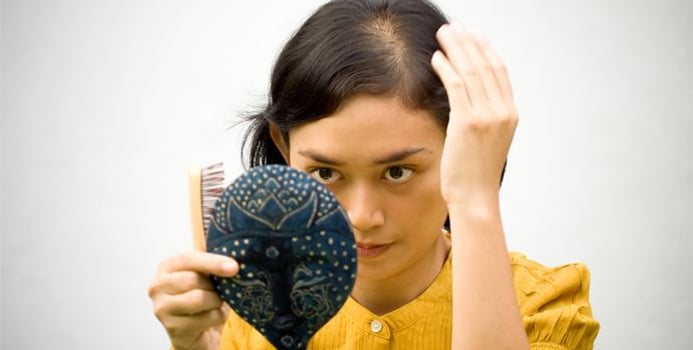Have you been shedding an unusually large amount lately and can’t quite figure out why? Some hair loss due to routine shedding is normal (losing 50 to 100 hairs daily), but if usual shedding increases or you have noticeably thinning hair, it’s important to find out why and seek treatment. While it depends on the cause, sometimes you can reverse hair loss or prevent further thinning.
1. Harsh Hair Products
Even the most common hair products can lead to hair loss if they contain harsh chemicals. Mayo Clinic reports that hot oil treatments and permanents can lead to hair follicle inflammation that causes hair loss — which can be permanent if scarring occurs. Other hair products that may contain harsh chemicals include dyes, especially those containing bleach, and over-the-counter insecticide treatments for lice.
2. Nutrient Deficiencies and Weight Loss
Poor nutrition and weight loss can also lead to hair loss. The American Academy of Dermatology reports that getting too little protein, iron, and calories is a culprit. Drastic weight loss is commonly associated with hair loss. To help minimize shedding, lose weight at a slow pace, and eat plenty of protein-rich foods like lean meats, poultry, fish, dairy foods, eggs, soy products, legumes, seeds, and nuts. Meat, seafood, legumes, spinach, tofu, and iron-fortified breakfast cereals are rich sources of iron.
3. Tight Pony Tails/Hair Extensions
Believe it or not, tight ponytails, tight braiding or cornrows, and hair extensions can cause hair trauma that leads to hair loss, according to the America Hair Loss Association. If detected early and you stop pulling your hair tight, hair should resume normal growth patterns.
4. Genetics/Older Age
Some people are genetically destined to lose hair with age, which is more common in men than women. If hair loss is due to genetics, ask your doctor about preventative medications, such as minoxidil, that can help slow hair loss or stimulate hair re-growth. Hair transplantation is also an option, but costly.
5. Medical Conditions/Infections
If your hair suddenly begins to fall out, it’s important for your doctor to rule out medical complications as a cause. According to the American Academy of Dermatology, the following health conditions can lead to hair loss: thyroid disorders, anemia, major surgery, flu, high fever, alopecia, ringworm of the scalp, and other infections. Check with your doctor to find out the cause of your hair loss and discuss treatment options.
6. Having a Baby
Many women experience hair loss after giving birth, which is due to changes in hormones. According to the American Pregnancy Association, hair loss often occurs about 3 months after giving birth but is temporary and shouldn’t cause baldness. While it may seem discouraging to lose large amounts of hair after having a baby, keep in mind you shed less than usual during pregnancy, so even after post-pregnancy hair loss your mane should end up about as thick as it was before pregnancy.
7. Menopause
Due to hormonal changes that occur during menopause, many women experience hair loss during this life stage. The American Academy of Dermatology notes that while hair loss during menopause is temporary, women older than age 40 should not expect hair to be as thick as it was when they were younger. Harvard Health Publications notes that using the medication minoxidil may help treat hair loss in menopausal women.
8. Stress
Stress can’t always be avoided but it does take a toll on your hair, according to the American Hair Loss Association. Fortunately, hair loss due to stress is usually temporary -- but see your doctor if hair loss continues after stressful events cease.
9. Chemotherapy
Chemotherapy, a form of cancer treatment, is a common cause or hair loss. In fact, many people who undergo chemotherapy lose all of their hair. Fortunately, hair re-growth occurs after chemotherapy treatment is complete. Breastcancer.org reports that hair begins to grow back about a month after chemotherapy ends – and may grow back thicker, curlier, straighter, or a different color or texture than original hair.
10. Medications/Supplements
Certain medications and supplements are also causes of hair loss. The following types of medicines may be the culprit, according to the American Academy of Dermatology: high dosages of vitamin A, steroids, birth control pills, blood thinners — and medications used to treat depression, gout, high blood pressure, heart problems, and arthritis.
[Image via Getty]



